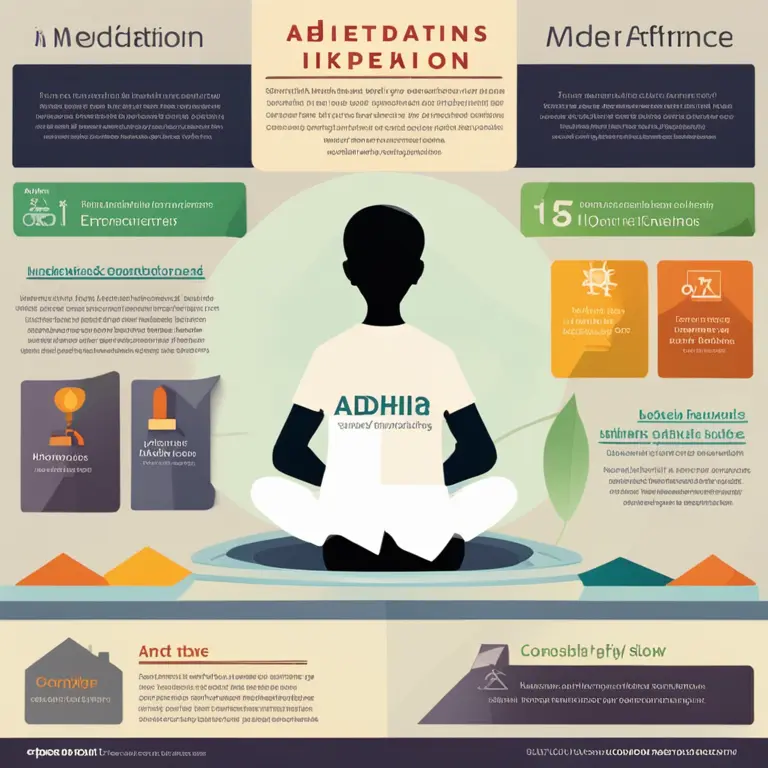
Meditation's Role in ADHD Management
Discover whether meditation can serve as a beneficial practice for individuals coping with ADHD in this in-depth article.
article by Hina Kurosawa
Meditation as a Coping Strategy for ADHD
Meditation has long been touted for its various health benefits including stress reduction and improved focus. For individuals with Attention Deficit Hyperactivity Disorder (ADHD), these benefits may be particularly enticing. With ADHD characterized by inattention, hyperactivity, and impulsivity, meditation — a mindful practice focusing on the present moment — could offer some relief. Although not a panacea, meditation is being examined as a complementary approach within a broader ADHD treatment plan. Recent studies suggest potential positive effects, which merits a discussion on the subject considering the increasing interest in alternative ADHD therapies.

Understanding ADHD and Meditation
ADHD is a neurodevelopmental disorder affecting both children and adults. While medication and behavioral therapies are standard treatments, meditation offers a different approach. It encourages practitioners to slow down their thoughts, become more aware of their senses, and learn to manage distractions over time. The practice stands out starkly against the typical experience of someone with ADHD, who regularly deals with an overactive mind. Mindfulness meditation, in particular, emphasizes the acceptance of all thoughts and sensations without judgment, potentially helping those with ADHD reduce the stress of managing their condition.

Research on Meditation's Efficacy for ADHD
In recent years, research into the use of meditation for ADHD has been picking up pace. A variety of studies have indicated that consistent meditation practice can lead to improvements in attention, behavior, and executive functioning—key areas affected by ADHD. For example, a pilot study published in the "Journal of Attention Disorders" in 2024 suggested that adults with ADHD who practiced mindfulness meditation experienced reduced symptoms and enhanced attention. Another study highlighted the potential of meditation in improving the working memory capacity of adolescents with ADHD.

Implementing Meditation Practices
Despite promising findings, effectively implementing meditation in the daily life of someone with ADHD can be challenging. It requires regularity and commitment, which can be difficult due to the nature of ADHD. Starting with short sessions and gradually increasing the duration can be one strategy. Mental health professionals sometimes recommend guided meditation or group sessions as a starting point. As with every therapeutic intervention, it is essential to tailor the practice to the individual's preferences and capabilities to increase the likelihood of sustained practice and ultimately, benefit from the intervention.

Meditation as a Supplementary Treatment
While the benefits of meditation for ADHD are becoming more evident, it's important to view the practice as part of a comprehensive treatment strategy. Meditation should not replace traditional treatments but can act as a supplementary intervention. Regular consultations with healthcare providers should guide the integration of meditation into the treatment program. An interdisciplinary approach that may include medication, cognitive behavioral therapy, and lifestyle adjustments, alongside meditation, offers a robust framework for managing ADHD symptoms.
Final Thoughts and Future Research
Meditation has potential as a supportive technique for ADHD, but there's still much to learn. Ongoing and future research will likely continue to shed light on how meditation can be optimized as part of ADHD management strategies. As we become increasingly informed, we can hope for more personalized and effective mindfulness-based interventions to emerge. For those affected by ADHD, open communication with healthcare providers about integrating meditation into their treatment may lead to better overall management of their symptoms and an enhanced quality of life.
Published: 1/14/2024
Modified: 1/15/2024
More predictions
Come back here soon to learn more about yourself and your future


Calming the Storm: Mindfulness Meditation for Anger
Discover how mindfulness meditation can be a powerful tool for anger management, promoting inner peace and emotional balance.


Mindfulness Meditation: A Handbook for High Schoolers
Discover how mindfulness meditation can benefit high school students, enhancing focus, reducing stress, and promoting overall well-being.


Easing Loneliness with Meditation
Discover how mindfulness meditation can provide solace and connection to mitigate feelings of loneliness, enhancing emotional and mental well-being.